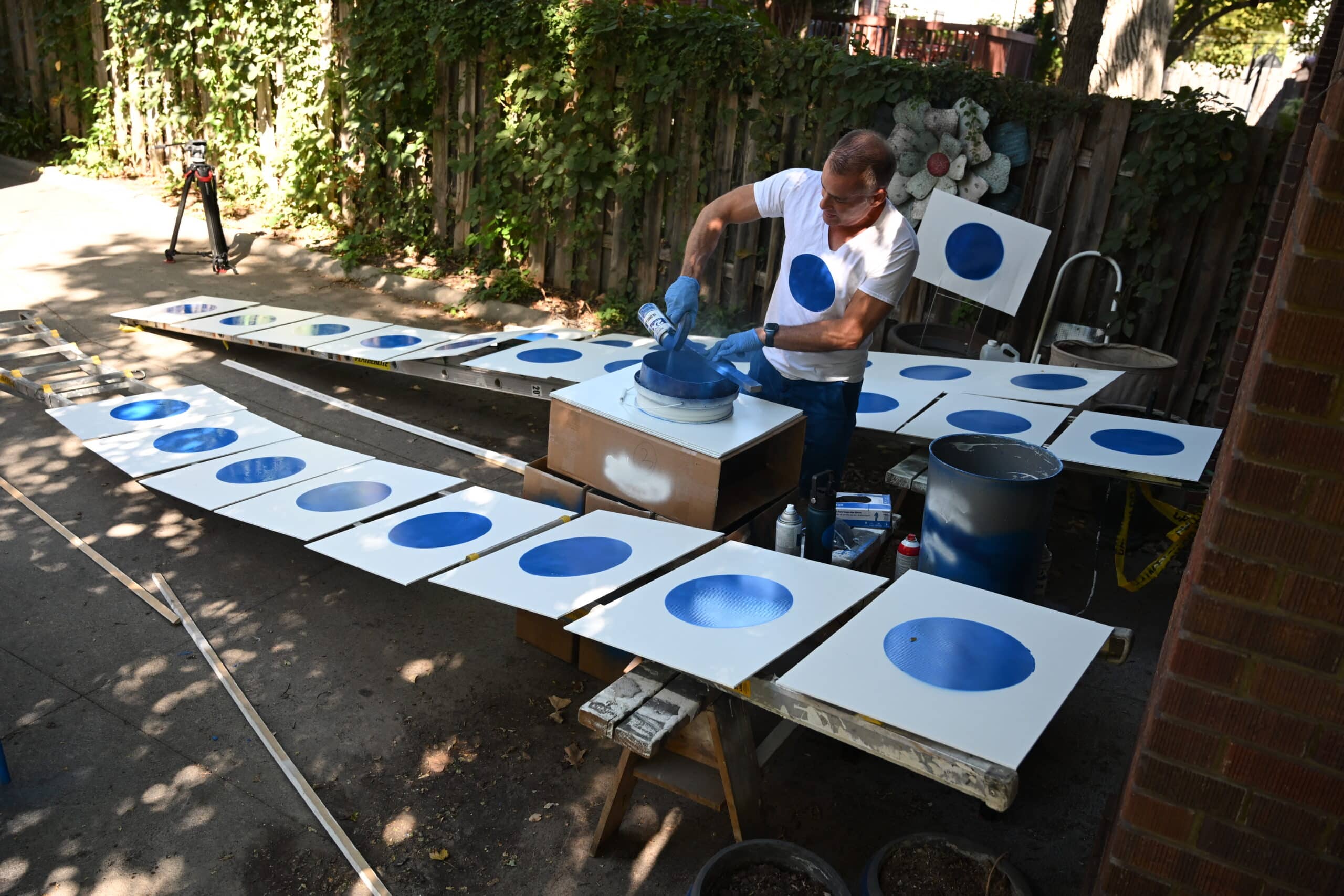
Jason Brown handcrafts political signs featuring a simple blue dot, at his home in Omaha, Nebraska, on September 30, 2024. Agence France-Presse
OMAHA, United States — Nestled deep in America’s heartland, Nebraska is best known for corn, cattle and college football — not usually for its elections. That could be about to dramatically change.
A strange quirk of the devoutly Republican state’s constitution essentially gives Omaha — the largest city — its own distinct and powerful vote for the next US president, in a race that remains too close to call just one month out.
In the far-from-impossible scenario that Kamala Harris and Donald Trump are otherwise tied in the Electoral College that determines the White House’s next occupant, this tiny Democratic-leaning “blue dot” of 650,000 people could have the final say.
READ: US election: five key moments in an extraordinary campaign
“We’re a mini-swing state within a state,” said 58-year-old Ruth Brown, a small business owner.
“Dang right. Come here and earn our vote, whether you’re a red candidate or a blue candidate,” added her husband Jason, 53.
Delighted and inspired by the unique opportunity of Nebraska’s unusual set-up — nearly every other state allocates all its presidential votes to one party — the Browns have taken matters into their own hands.
They have distributed thousands of hand-made lawn signs bearing simple blue dots to homes across Omaha, wordlessly reminding neighbors that this progressive island can tip the balance against Trump.
READ: Trump on the stump, Harris hits airwaves in razor-edge US election
What began with Jason crudely spray-painting an old placard in his garage has become a city-wide viral phenomenon.
And it appears to be having an impact.
While in recent elections Omaha has fluctuated between Republican and Democratic candidates, Harris is 10 points clear of Trump in polls here.
“It’s fun to matter on a national level,” said the Browns’ neighbor Chris Kilroy, a 55-year-old financial adviser and registered independent, who installed a blue dot in his own front yard.
“This is a red state, but once in a while we get to throw a little sand in the gears.”
‘Fired up’
Democrats have poured some $15 million into the district, flooding Omaha’s airwaves with campaign commercials.
Though heavily outspent, Republicans mounted a major effort last month to change Nebraska to a winner-takes-all system.
Prominent US senator Lindsey Graham visited to corral legislators, and Republican state senator Merv Riepe had a phone conversation with Trump.
“He just said, ‘Nebraska is important to me,’ and I think in that message we knew why he called — what he wanted,” Riepe told AFP.
But the bid failed, and Democratic state senator John Cavanaugh believes it has now backfired on Republicans.
“People here were fired up to vote for Vice President Harris, and you’ve seen an exponential increase in energy as a result of the attempt to take away our vote,” he said.
Don Bacon, the Republican congressman battling to retain his House seat in Omaha, conceded that most local residents want to keep their presidential vote.
But he questioned why Democrats were so staunchly defensive of Nebraska continuing to split its presidential votes, when liberal states like California and New York do not.
“It hurts Republicans. There’s no doubt about it,” he told AFP.
Some residents agree. Nancy Bohnenkamp, a retired restaurant owner in Omaha, wants to switch to “winner-takes-all, just like everybody else.”
“Stop the madness,” she said.
‘Quintessentially Midwest’
She considers the frenzy around “blue dot” yard signs and memes “childish.”
But to Precious McKesson, executive director of the Nebraska Democratic Party, the entirely organic and grassroots movement is “educating people that their vote matters.”
“Because if their votes didn’t matter, the Republicans wouldn’t be cheating and trying to change the system.”
For others, the placards represent something greater — a rebuke to an era of bitter, confrontational partisan politics.
The Browns said their best decision was not to put any words or slogans on the yard signs.
“It’s friendly, it’s warm, it doesn’t scream — so many political things you’re getting screamed at,” said Jason Brown.
Alyx Rice, 36, whose bustling Omaha store sells “blue dot” signs and sweaters, said the symbol is a “quintessential Midwest way to tell your neighbors where you stand… cute and passive-aggressive.”
Still, attorney Joy Suder, 51, who was buying a “blue dot” T-shirt this week, admitted the prospect of tipping the election Harris’s way is tantalizing.
“How cool would that be?” she said. “That would be awesome.”